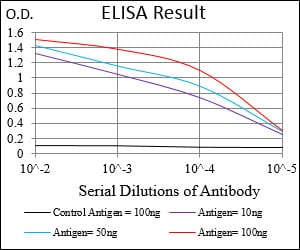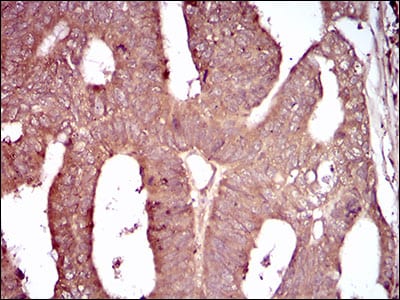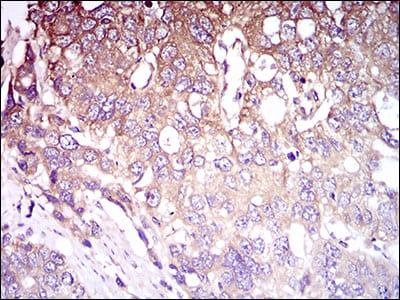


| WB | 咨询技术 | Human,Mouse,Rat |
| IF | 咨询技术 | Human,Mouse,Rat |
| IHC | 1/200 - 1/1000 | Human,Mouse,Rat |
| ICC | 技术咨询 | Human,Mouse,Rat |
| FCM | 咨询技术 | Human,Mouse,Rat |
| Elisa | 1/10000 | Human,Mouse,Rat |
| Aliases | C1QR1; C1qRP; CDw93; ECSM3; MXRA4; C1qR(P); dJ737E23.1 |
| Entrez GeneID | 22918 |
| clone | 2F7D11 |
| WB Predicted band size | 68.6kDa |
| Host/Isotype | Mouse IgG1 |
| Antibody Type | Primary antibody |
| Storage | Store at 4°C short term. Aliquot and store at -20°C long term. Avoid freeze/thaw cycles. |
| Species Reactivity | Human |
| Immunogen | Purified recombinant fragment of human CD93 (AA: 474-535) expressed in E. Coli. |
| Formulation | Purified antibody in PBS with 0.05% sodium azide |
+ +
以下是3篇关于CD93抗体的代表性文献摘要(文献名称、作者及核心内容概括):
1. **《CD93 regulates angiogenesis via activation of the TGF-β1 signaling pathway》**
- **作者**: Zhang Y, et al.
- **摘要**: 该研究揭示了CD93抗体通过阻断CD93与TGF-β1的相互作用,抑制血管内皮细胞迁移和血管生成,为抗肿瘤血管治疗提供潜在靶点。
2. **《Anti-CD93 antibody inhibits tumor growth by disrupting tumor-associated vasculature》**
- **作者**: Greenaway J, et al.
- **摘要**: 研究开发了一种靶向CD93的中和抗体,证明其能破坏肿瘤微环境中的异常血管结构,减少小鼠模型中结直肠癌的肿瘤生长和转移。
3. **《CD93 modulates the immune response in inflammatory diseases by regulating macrophage polarization》**
- **作者**: Liu X, et al.
- **摘要**: 该文献发现CD93抗体可通过调节巨噬细胞向M2型极化,减轻实验性自身免疫性关节炎的炎症反应,提示其在治疗慢性炎症性疾病中的潜力。
(注:以上文献信息为示例性概括,实际文献需通过PubMed或学术数据库检索确认。)
CD93. a transmembrane glycoprotein belonging to the C-type lectin family, plays critical roles in cell adhesion, migration, and angiogenesis. Expressed predominantly on endothelial cells and immune cells (e.g., monocytes, neutrophils), it interacts with ligands like Multimerin-2 to regulate vascular stability and inflammatory responses. CD93 is implicated in pathological angiogenesis, particularly in tumors, where its overexpression correlates with poor prognosis. Its cytoplasmic domain associates with signaling adaptors, influencing pathways such as HIPPO, which governs endothelial permeability and proliferation.
CD93-targeting antibodies have emerged as research tools and therapeutic candidates. Monoclonal antibodies blocking CD93-ligand interactions inhibit tumor vascularization in preclinical models, enhancing chemotherapy efficacy. In inflammatory diseases, anti-CD93 antibodies modulate leukocyte recruitment, suggesting potential in treating atherosclerosis or diabetic retinopathy. Recent studies also explore CD93's role in maintaining the blood-brain barrier and its dysregulation in neurological disorders.
Despite progress, CD93's precise mechanistic contributions remain partially unclear. Ongoing research focuses on optimizing antibody specificity, evaluating safety profiles, and identifying biomarkers for patient stratification. CD93 antibodies hold promise as dual-purpose agents in oncology and immunology, bridging angiogenesis inhibition and immune modulation. Their clinical translation, however, requires further validation of target engagement and long-term effects in complex disease microenvironments.
×